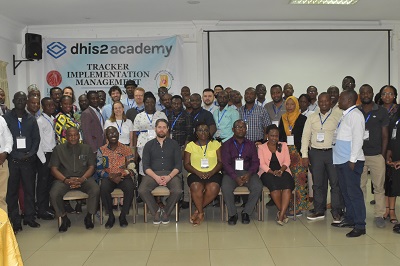
The Ghana Health Service (GHS) is seeking the support of corporate institutions and development partners to upscale its e-tracker project across the country for a much efficient health system.
The e-tracker is an electronic application (app) which allows health service providers to register and track clients using mobile devices at the primary care level.
The tool has since 2018 been fully deployed in the entire Upper East, Volta and Eastern regions, but, according to Director, Policy, Planning, Monitoring and Evaluation (PPME) of the GHS, Dr Koku Awoonor, scale up of the project to other regions has been slow due to inadequate funds.
Speaking with the Ghanaian Times yesterday at the opening of a six-day workshop on the District Health Information Software 2 (DHIS2), the Director of PPME indicated that the Service hoped to roll out the e-tracker in the Central and Upper West regions this year.
“Because it is capital intensive to get the devices, train staff and deploy them to the various districts, the roll out has been quite slow but hopefully with enough support we anticipate that by 2021, we can cover the entire country,” he said.
The importance of the e-tracker, Dr Awoonor noted, could not be overemphasised as it facilitated accurate data on clients to ensure continuum of care away from the use of manual registers to take information of patients which often got misplaced.
The app, he argued, was also essential for decision-making processes concerning the health sector to enhance service delivery.
Deputy Director General of the GHS, Dr Anthony Ofosu, in an address, feared the health sector would cease to exist without accurate, reliable and timely health information as data “is not only confined to the sector, but overlaps with information systems in other fields.”
According to him, the e-tracker platform formed part of interventions by the GHS to infuse Information, Communication and Technology (ICT) into its operations as basis for “continuum of care for clients so that everyone enrolled unto any programme can be followed successfully to get the full benefit of the intervention.”
Dr Ofosu disclosed that at the moment “HIV/ART e-tracker” devices had been deployed to all anti-retroviral therapy (ART) sites, as such, “the country stands in a position to generate current data on care or ART treatment for persons living with HIV (PLHIV).”
He, however, enumerated challenges of data synchronisation, installation and connection to a larger existing database which militate against the e-tracker project, and appealed to experts to help the Service improve the system.
On his part, Markus Bekken, Team Leader of the Tracker Development of the University of Oslo, developers of the DHIS2, pledged the university’s continuous assistance to the GHS to improve the project to better serve the populace.
The DHIS2 is an open source, web-based health management information system (HMIS) platform to, among others, monitor patient health, improve disease surveillance, map disease outbreaks and speed up health data access for health facilities and organisations.
The six-day workshop underway, which has assembled participants, including programme managers, technical leads, architects and development partners, hopes to build capacity and share best practices in overseeing and sustaining a tracker project.
BY ABIGAIL ANNOH







